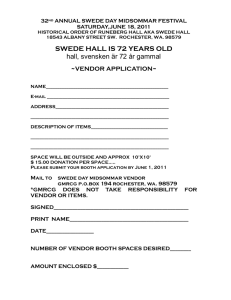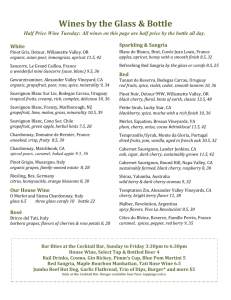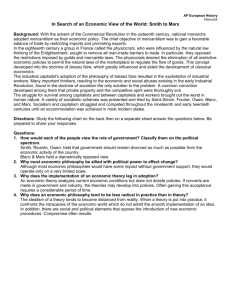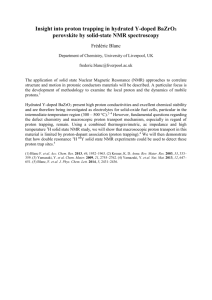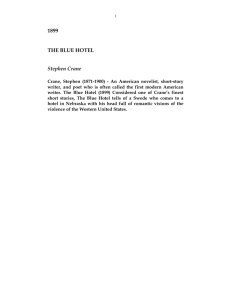CraneFinal.doc - mvhsandrusclass
advertisement
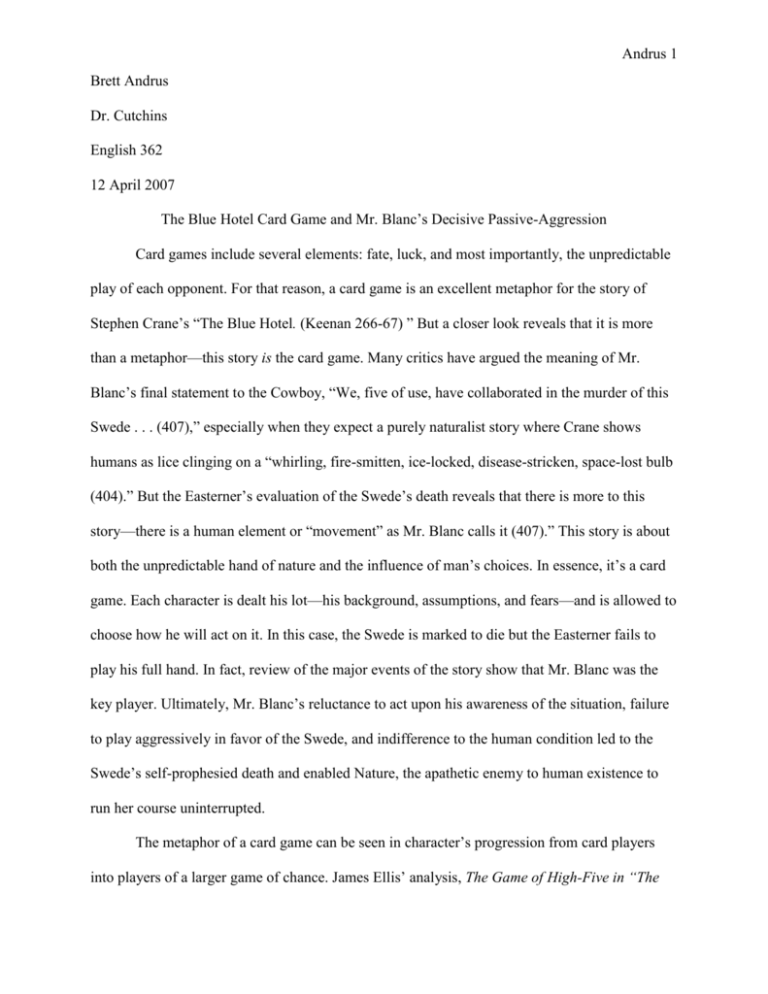
Andrus 1 Brett Andrus Dr. Cutchins English 362 12 April 2007 The Blue Hotel Card Game and Mr. Blanc’s Decisive Passive-Aggression Card games include several elements: fate, luck, and most importantly, the unpredictable play of each opponent. For that reason, a card game is an excellent metaphor for the story of Stephen Crane’s “The Blue Hotel. (Keenan 266-67) ” But a closer look reveals that it is more than a metaphor—this story is the card game. Many critics have argued the meaning of Mr. Blanc’s final statement to the Cowboy, “We, five of use, have collaborated in the murder of this Swede . . . (407),” especially when they expect a purely naturalist story where Crane shows humans as lice clinging on a “whirling, fire-smitten, ice-locked, disease-stricken, space-lost bulb (404).” But the Easterner’s evaluation of the Swede’s death reveals that there is more to this story—there is a human element or “movement” as Mr. Blanc calls it (407).” This story is about both the unpredictable hand of nature and the influence of man’s choices. In essence, it’s a card game. Each character is dealt his lot—his background, assumptions, and fears—and is allowed to choose how he will act on it. In this case, the Swede is marked to die but the Easterner fails to play his full hand. In fact, review of the major events of the story show that Mr. Blanc was the key player. Ultimately, Mr. Blanc’s reluctance to act upon his awareness of the situation, failure to play aggressively in favor of the Swede, and indifference to the human condition led to the Swede’s self-prophesied death and enabled Nature, the apathetic enemy to human existence to run her course uninterrupted. The metaphor of a card game can be seen in character’s progression from card players into players of a larger game of chance. James Ellis’ analysis, The Game of High-Five in “The Andrus 2 Blue Hotel,” explains that High-Five is a game allowing 2-6 players which contains high-pointvalue but vulnerable trump cards and is dictated by chance (440-41). Ellis goes on to explain that five men in the hotel, and ultimately the saloon gambler, first join the table card game and then the larger game progressively until all six positions are taken, the crucial point being the Swede’s accusatory remark to Johnnie, which elevates the game from a microcosm to a macrocosm where the men “themselves become cards played upon by fate” (Ellis 441). Recognizing the characters are playing a large scale game of chance clarifies the apparent contradiction in the Easterner’s collaborative explanation of the Swede’s death and the naturalist message on the cash register in the saloon. The Swede got “the amount [of his] purchase” (407) or was killed because fate dealt him the death card. And the Easterner’s condemning remarks about collaboration explain how he and the other players worked together against the Swede to win the game. Therefore, the game in the Blue Hotel has elements of both naturalism and human influence. Naturalism because the Swede did get the lot he drew by chance and human influence because Mr. Blanc and the others played against him. Therefore metaphor is effective because such a combination of chance and determinism do exist within a game of cards. The advantaged awareness of Mr. Blanc implicates him as a key player, one who controls the Blue Hotel game of fate through passive play. According to Walter Sutton, Mr. Blanc is “the one perceptive person in the story” (73) giving him (Blanc) an unfair advantage in the game. Eric Solomon and Max Westbrook add that the Easterner is the “only man capable of understanding” the Swede (262, 594). But Mr. Blanc does more than just interpret the Swede’s strange behavior; Mr. Blanc actually perceives the nature of each of the men and adjusts his actions accordingly. Unlike the Swede, he realizes that the hotel is not “the middle of hell” (395) but unlike the others, he sees the potential dangers of isolation, particularly for the Swede and any who call Andrus 3 attention to the dangerous life of the West. Thus, the Easterner has advantage over the others— he can see all the cards and is in position to dictate the game, to chose whether or not to contest the impending the fate of the Swede. Evidence of the Easterner’s play on perception is found in his card table explanation of the Swede’s behavior. At first Mr. Blanc appears to have no answers. “I don’t understand you,” he tells the Swede when the Swede looks to him for help (392). Later when Scully asks what’s been going on, the Easterner replies, “I didn’t see anything wrong at all” (393). These responses appear innocent but they don’t really represent Mr. Blanc’s comprehension of the game just as his appearance doesn’t suggest his origin (389). In both of the cases mentioned above, Mr. Blanc reflects slowly before replying (392-93). Why must he reflect? Because he knows the Swede’s problem and is considering how to play upon that knowledge. Later he finally asserts, “ . . . it seems to me this man has been reading dime novels and he thinks he’s right out in the middle of it—the shootin’ and stabbin’ and all” (395). Mr. Blanc presents his idea as an assumption but Scully’s explanation of the events upstairs (396) prove the diagnosis to be right on the mark. How was the Easterner able to identify the Swede’s problem so easily? According to Walter Sutton, Mr. Blanc could appreciate the Swede’s fear of Western societies because he had the same fear, the only difference being that his fear was rooted in his understanding to man an nature” (74) He knew how to play the game! And so realizing the potential danger of alienating oneself, he choose to be “cautious and wary in his movements and conversations” (Sutton 75). Essentially, Mr. Blanc chose to play passively. And his decision to not support the Swede’s assumption proves to be his first move against the Swede. Further indication of Mr. Blanc’s awareness of the moves of each player emerges in the narrator’s description of Mr. Blanc’s passive-aggression during the fight. While outside, “the Easterner’s mind, like a film took lasting impressions,” allowing him to perceive the isolation the Andrus 4 Swede felt (400-401). At this time, the other men are engaged in the emotional struggle of the conflict. But Crane shows that Mr. Blanc is not as clueless as his name (blank) might imply. In fact, Mr. Blanc is the only one who perceives the loneliness and isolation of the Swede (401) because he is privy to all the elements leading up to the fight. He knows why the Swede was scared, why Johnnie was accused of cheating, and that he (Mr. Blanc) has the power to stop it— he has the trump card. He can change the fate of all involved. But Mr. Blanc is too uncomfortable to play his cards aggressively. All he dares to do is “importun[e] in a voice that was not heeded,” saying “wait a moment . . . What’s the good of a fight over a game of cards?” (398) Here again, the Easterner’s failure to play his cards dictates the outcome of the game. He pleads for the fight to be abandoned but gives no explanation why. He doesn’t tell the whole story, board-whack, or change his superior cards with force taking “tricks with a glowing air of prowess” like others do at the card table (391). Therefore, the fight continues—despite efforts to separate himself from the conflict—a result of his passive play. He has allowed it because he hasn’t played his trump card. Mr. Blanc’s indifference to human struggles also shapes his decision for passive play in the Blue Hotel game of chance. The most extreme example of Blanc’s apathy is shown in his reaction to the end of the fight. This same feeling though, is foreshadowed by the narrator’s mention of the Easterner’s indifferent attitude to playing a game of High-Five at the table with the others earlier in the story (397). Then after the fight, all Mr. Blanc could think about is how the wind seemed to “come direct from the shadowed arctic flows” and wonder how it had not killed him (402). He thought nothing about the “vanquished man” and rushed immediately to the stove to warm himself by the fire (402). This lack of concern explains why Blanc didn’t play more aggressively. In the end, he didn’t care who won as long as he didn’t prove the loser of the game. Andrus 5 Walter Sutton argues that Mr. Blanc wasn’t indifferent—that he did his best to try to stop the fight, that he tried to “identify himself with the other characters and sympathize with them” (75). He continues, “[i]t is he alone who expresses pity at the pain which is being needlessly inflicted and wishes to stop the fight” (75). What Sutton fails to recognize is that Mr. Blanc sees the fight as needless because he holds the information to stop it. If Mr. Blanc had felt any true empathy or pity, he would have played the trump card; he would have announced that Johnnie cheated! Such a strong play would have shown the uselessness of the fight. But Mr. Blanc only pleads gently because his guilt only takes him that far. He may not want Johnnie to get hurt; but, he, Mr. Blanc, is more concerned about being brave, about showing his full hand. And once the fight is over he feels there is nothing to worry about; no more pain can be inflicted, so he ceases to care. The concluding section of the story confirms two elements of Mr. Blanc’s perception of and implication in the death of the Swede. First, Blanc reveals that “Johnnie was cheating.” And second, that all the characters were involved in the Swede’s death (403). The interesting thing about this revelation is that for the first time, someone other than the Easterner can see all the cards. Mr. Blanc condemns the cowboy for his foolishness, but the cowboy rightly questions, “Well, I didn’t do anythin’, did I?” (408) Certainly, the cowboy was part of the collaborative effort that expelled the Swede, (Westbrook 589) but his question appropriately points right back at the Easterner. How was the cowboy supposed to know that the Johnnie was cheating? If he didn’t know, he doesn’t hold the same amount of responsibility for the Swede’s death as the Easterner does. The cowboy acted aggressively according to what he perceived. He played his whole hand. He was simply deceived by the fact that he hadn’t seen all the cards. In contrast, the Easterner knew, possibly from the beginning, (Solomon 262) that Johnnie was cheating and may have reversed the nature of the fateful game. Andrus 6 Ultimately, the Easterners’ passive-aggressive play not only controls the game, it reveals him as a traitor. By electing to protect himself through playing a know-nothing ideology or card, the Easterner joins the side of the other three men in the game. “I don’t understand you” says Mr. Blanc after which the Swede moves in a way that “announced that he thought he had encountered treachery from the only quarter where he had expected sympathy if not help” (392). Solomon calls such action a “conspiracy of silence” (262). This silence proves more dangerous to the Swede than any other element. It’s almost as if the Swede knew Mr. Blanc had a trump card and expected it to be played in his favor. In the end, the Swede could beat Johnnie and handle the cold but he had no weapon against Mr. Blanc’s move to be silent. Despite everything he had done to control the situation, the Swede is left in the hands of his fellow—easterner who as Daniel Knapp suggests, has, like Pilate of the New Testament, washed his hands of guilt through a ‘small ceremony’ (252) upon arrival at the hotel (270-71). Yeah the other men washed their hands too, but it was the Easterner (as well as the cowboy) who “burnished” himself “fiery red with this water, until it seemed like some kind of metal polish” (390) that would hopefully protect him from his future crime. Eventually though, even the Easterner loses control of the Blue Hotel game of chance and regrets his passive lay of cards. Up until the Swede leaves the hotel Mr. Blanc has played against the Swede but the Swede is still alive. The fight is a dangerous moment. At that point, Mr. Blanc is so nervous that he can’t put on his coat without trembling, (399) but Johnnie can’t overcome the Swede’s determination—much to the relief of the Easterner, (402) again because he knows the cause of the fight—he’s still holding the trump card. Therefore, Mr. Blanc’s interest in the Swede’s survival (and Johnnie’s) is out of the shame he feels knowing that he could prevent the conflict. Mr. Blanc is relieved to see the fight end because he thinks the conflict has finally ended—he thinks the game is over. What Mr. Blanc fails to realize is that the Andrus 7 game continues as the Swede leaves the hotel (Ellis 441-42). But the players have changed and Mr. Blanc is no longer in control. His cards no longer matter because his play has been halted while another player has his turn. The final play trumps the Swede and puts him out of the game. But this play is one of chance—one that no one else saw coming. Mr. Blanc, Scully, Johnnie, and the Cowboy couldn’t have known that the Swede would meet a knife carrying gambler. Maybe Mr. Blanc sensed that this final card was in the deck but it was hidden deep, waiting to punish the player who drew it into their hand. The only thing that could have been done to stop it would have been to end the game earlier—before the stakes rose to fateful levels. Mr. Blanc was the only one who could understood the game well enough at all its levels to do so, but out of fear of being to aggressive, out of fear of exposing himself, he held back—a play which proved to be more deterministic in the outcome of the game than that of any of the others. In conclusion, the metaphorical game of chance in “The Blue Hotel” exposes the Easterners active, though passive-aggressive, role in the death of the Swede. No, the blame can’t all be placed on him; the Swede was marked to die, or at least a death card was in the deck and landed in his hand. Certainly the others collaborated through their participation in the game. They all laid down their best aces against the Swede. But the Easterner knew all the cards; he knew Johnnie cheated, he knew the nature of the other men, and he knew the fears the Swede had. His failure to act aggressively upon that knowledge was the card that the Swede couldn’t trump. It backed the Swede into a corner that left him vulnerable to the unforgiving nature of fate—and fate played its most feared card to end the game. Andrus 8 Works Cited Crane, Stephen. “The Blue Hotel.” Fiction 100: An Anthology of Short Fiction. Ed. James H. Pickering. Upper Saddle River: Prentice Hall, 2004. 389-408. Ellis, James. “The Game of High-Five in “The Blue Hotel’” American Literature. Nov.1977: 440-42. JSTOR. 8 March 2007. Keenan, Richard. “The Sense of an Ending: Jan Kadar’s Distortion of Stephen Crane’s The Blue Hotel” Literature and Film Quarterly. Winter 1988: 265-68. EBSCO 12 March 2007. Knapp, Daniel. “Son of Thunder: Stephen Crane and the Fourth Evangelist:” Nineteenth-Century Fiction. 24.3 (1969): 253-291. JSTOR. 9 March 2007 Solomon, Eric. Stephen Crane: From Parody to Realism. Cambridge: Harvard UP, 1966 Sutton, Walter. “Pity and Fear in ‘The Blue Hotel’” American Quarterly. Spring1952: 73-78. JSTOR.8 March 2007 Westbrook, Max. “Stephen Crane’s Social Ethic.” American Quarterly. Winter 1962: 587-96. JSTOR. 22 March 2007.
